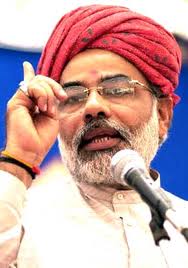 Ahmedabad, August 21: Thousands of poor voters of Gujarat surged towards Congress camps for distributing forms for dirt-cheap urban housing — a promise the Congress has made only to women in a determined bid to prevent chief minister Narendra Modi from winning his third successive state election.
Ahmedabad, August 21: Thousands of poor voters of Gujarat surged towards Congress camps for distributing forms for dirt-cheap urban housing — a promise the Congress has made only to women in a determined bid to prevent chief minister Narendra Modi from winning his third successive state election.
The scheme targets lower and lower-middle income groups in the cities and towns of Gujarat and gave a shot in the arm to the jaded Congress, just months away from the assembly elections. The Congress has not tasted power in Gujarat for more than two decades and the 'Ghar Nu Ghar' scheme was one of the aces it had up its sleeve to halt Modi's march to New Delhi in 2014 as a clear prime ministerial prospect.
There was commotion at form distribution centres and frayed nerves in the Modi camp when the distribution of forms began at 550 camps across Gujarat. The Congress, which marked Rajiv Gandhi's birthday with this blitzkrieg, has offered houses to be registered in the name of women. State Congress president Arjun Modhwadia said nearly 28 lakh forms were distributed in eight cities and 159 towns with a target of building 15 lakh homes in five years if the Congress was voted to power in the assembly elections due later this year.
"We have ordered for printing of 10 lakh more forms," senior Congress leader Narhari Amin said. Other Congress leaders were also pleasantly surprised at the mad rush, even as Modi went into a huddle with close aides. Even his 'Sadbhavana' towards Muslims seemed to be under threat as hundreds of Muslim women forgot the Eid festivities to queue up for the forms, which were available free on mere presentation of the voter's i-card.
BJP reacted by calling 'Ghar nu Ghar' a conspiracy to misguide the women voters of Gujarat. "Congress is in the habit of cheating people," said party spokesmen I K Jadeja and Mansukh Mandaviya. "In the last Lok Sabha election, they promised to check inflation within 100 days and look where we are today," Jadeja said.
The scheme seems to have hit the bull's eye as women are seen as more committed voters of Modi. Besides, the BJP has been traditionally stronger in urban areas of Gujarat. The Congress hopes that all those women who have taken the forms would elect it to power.
Housing for urban poor was a hallmark of previous Congress governments when the Gujarat Housing Board constructed precisely 1,76,830 homes in the 1970s and 1980s. Once the BJP came to power, the GHB went defunct and housing was a subject left to the builders.
Trouble for BJP on home front
The BJP had initially reacted with scorn at the Congress scheme 'Ghar nu Ghar'. Even chief minister Narendra Modi had brushed it aside stating that this was the brainchild of fly-by-night operators. But when the Congress launched the scheme on August 2, on the occasion of Rakshabandhan, nearly one lakh forms were distributed to women from the Gujarat Pradesh Congress Committee office in Ahmedabad and nine other centres across Gujarat.
The BJP had to sit up and take notice now. Former urban development minister I K Jadeja, now party spokesman, came with an announcement that the BJP will build 2.5 lakh houses for urban poor, once voted back to power. Questions were also raised by the BJP on where the Congress would get land for building these lakhs of houses. Congress campaign committee chief Shankersinh Vaghela had retorted that he would seize all the 'benami' land held by BJP leaders and also take back land gifted to large industrial houses.
Times View
The Congress has finally managed an emotional connect with the people of Gujarat with the 'Ghar nu Ghar' scheme. But it is after all an election promise and there is a massive gulf between the cup and the lip. What the Congress scheme has shown is that there is a massive demand for affordable housing in the state. The BJP has to explain why it has turned the Gujarat Housing Board, which built nearly 1.75 lakh affordable homes during previous Congress regimes, into a defunct entity. The GHB has to be revived and turned into the main agency to cater to the housing needs of those left without a dream home in this builder-driven set-up.







Comments
Add new comment